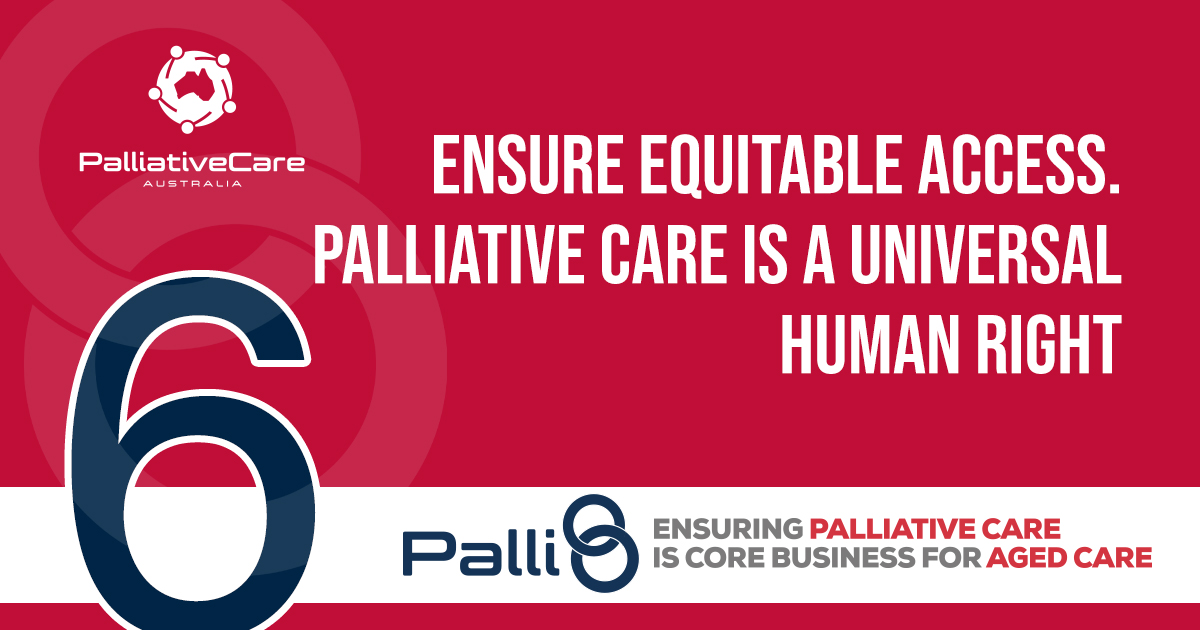Ensure Equitable Access - palliative care is a universal human right
Ensure Equitable Access - palliative care is a universal human right
Thursday, November 05, 2020
The diversity of the Australian population and geography means that no single model of palliative care works universally. Therefore, work must be done to ensure the models can be adapted to provide equitable access across Australia. This includes investment in, and development of, innovative models of care to provide equitable access to specialist and generalist palliative care services for all older Australians when and where they need them.
Older Australians living in rural and remote locations face unique challenges in accessing aged care services that are person-centred, timely, flexible and allow them to remain in their community. These challenges are further exacerbated when people need to access specialist health services including allied health, nurse practitioners and palliative care specialists. Services models that are flexible and adaptive to the unique challenges of each geographic location would support older Australians to access the same levels of palliative care as those in metropolitan locations.
Older Australians have a diverse range of life experiences, cultural backgrounds, religion, spirituality, sexuality and socio-economic status. Some older people with diverse needs may experience exclusion, discrimination and barriers to accessing appropriate health and aged care services. There continues to be a range of older Australians who struggle to access appropriate and timely palliative care services. Many people with diverse needs are underserved by the current aged care and health systems and struggle to access culturally safe and inclusive services. The aged care industry needs to understand better the barriers to care and the reasons why some populations may be underserved. There also needs to be a broader awareness of culturally safe care and, how to deliver this to care recipients supported by workforce training and stronger enforcement of the relevant Aged Care Quality Standards.
On 22 October 2020, the Royal Commission into Aged Care Quality and Safety’s Counsel Assisting presented 124 proposed recommendations to the Commissioners. PCA welcomes these recommendations to improve the aged care system, including the following recommendations relating to meeting the needs of diverse people and remote service delivery:
- Recommendation 1: A New Act - this proposes the introduction of a new Aged Care Act guided by principles that recognise Aboriginal and Torres Strait Islander people’s entitlement to culturally safe care, the right of older people to access care and support irrespective of their location or personal circumstances and support for special or vulnerable groups to access care.
- Recommendation 19: Designing for Diversity Needs of diverse people - this proposes that aged care staff and assessors be appropriately trained to meet the needs of diverse people and auditing of gaps in services for diverse people and to address these deficits.
- Recommendations 32-38: these are a range of recommendations relating to aged care services for Aboriginal and Torres Strait Islander People. This includes the delivery of culturally safe, trauma-informed and flexible services, services that allow people to remain on country, prioritising Aboriginal and Torres Strait Islander service providers and increased employment and training for Aboriginal and Torres Strait Islander workers.
- Recommendation 78-79: these propose identifying services gaps in regional, rural and remote areas and planning for the aged care needs in these areas, including the expansion of the Multi-Purpose Service program.
Further detail on Palliative Care Needs and Underserved Populations is available in PCAs second submission to the Aged Care Royal Commission into Aged Care Quality and Safety.
